
Unclaimed Money Lookup - Louisiana
Free Louisiana Unclaimed Money Lookup
We receive referral fees from partners (advertising disclosure)
The information we provide you is free of charge and a result of extensive research by our home warranty experts. We use affiliate links on our site that provide us with referral commissions. While this fact may not influence the information we provide, it may affect the positioning of this information.
(advertising disclosure)
The information we provide you is free of charge and a result of extensive research by our home warranty experts. We use affiliate links on our site that provide us with referral commissions. While this fact may not influence the information we provide, it may affect the positioning of this information.

Louisiana Unclaimed Money -
The Ultimate Guide 2025
- UPDATED January 2025
Discover the Optimal Methods for Reclaiming Abandoned Property: Your Ultimate Guide to Unclaimed Money in Louisiana
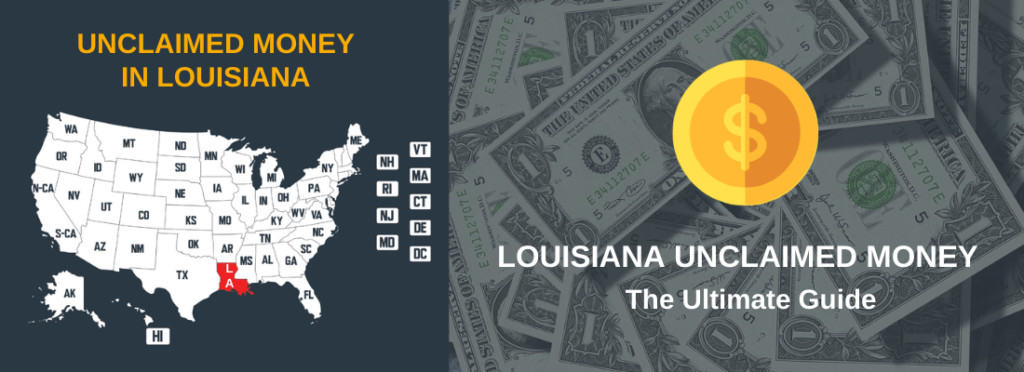
Contents
- Your Guide to Unclaimed Money in Louisiana
- What is Unclaimed Property in Louisiana?
- How to Find Unclaimed Money in Louisiana
- Steps to Claiming Abandoned Property in Louisiana
- What Information Do You Need to File in Louisiana?
- Keeping Track of Louisiana Claims
- Where Else Can You Look for Abandoned Property?
- How Much Unclaimed Property is in Louisiana?
- Louisiana Unclaimed Property Laws

Your Guide to Unclaimed Money in Louisiana
Welcome to Louisiana, affectionately known as the Bayou State, a place steeped in a rich history. Many of today’s residents trace their heritage back to the Creole and Cajun cultures, whose roots extend to France. The Louisiana State Treasurer is committed to reuniting locals with their forgotten assets, which led to the creation of the Louisiana Unclaimed Property website. As of 2023, this platform has successfully facilitated the return of over $741 million to its rightful owners, with millions more patiently awaiting discovery. Rest assured, these unclaimed accounts are added to the website only when the holding organizations exhaust all efforts to locate their original owners. Your unclaimed property may be just a click away.

While you might initially think that the website’s database holds no treasures for you, it’s truly worthwhile to explore. The entity responsible for your unclaimed property may have attempted to contact you through outdated addresses or phone numbers. Additionally, it’s possible that abandoned property could belong to your parents or grandparents, featuring provisions allowing you to claim it as an heir. In our comprehensive guide to unclaimed money in Louisiana, we will delve into the types of property you can reclaim, provide insights on navigating the database effectively, and address your burning questions. Your financial surprises may be waiting just around the digital corner.
What is Unclaimed Property in Louisiana?
In Louisiana, unclaimed property encompasses assets that owners have abandoned or neglected. The holders of such property employ various methods to contact the owner, including sending letters and making phone calls to the listed address and number. They may also investigate the owner’s previous bank accounts or search for evidence of the owner’s passing.
When all efforts to locate the owner prove unsuccessful, the holders are compelled to contact the Louisiana State Treasurer and request the transfer of the property to the state’s custody. Subsequently, the treasurer employs additional resources and techniques to locate the owner before adding the property to the online database.
Types of Unclaimed Property
- Insurance Payouts: A common form of unclaimed property in Louisiana, especially life insurance policies, can often go unnoticed. Beneficiaries may not be aware of these policies, particularly if they were obtained through former banks or employers.
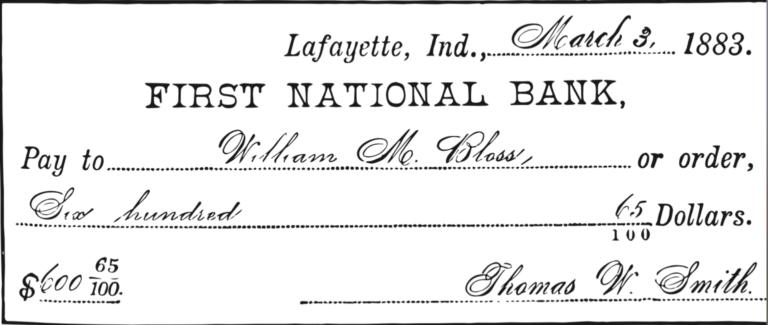
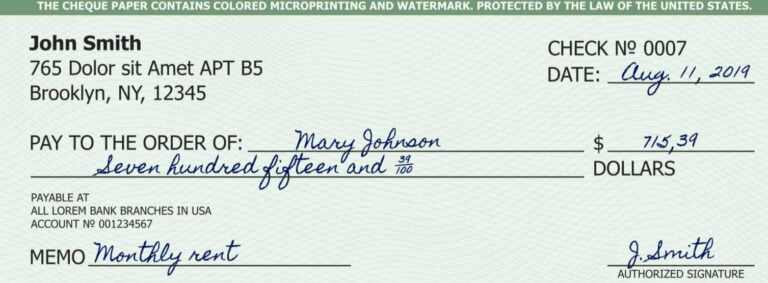
- Dormant Bank Accounts: Bank accounts that have remained untouched for an extended period may become unclaimed property. Contrary to the belief that banks will automatically close these accounts, they typically keep them secure and accruing interest for at least a year.
- Physical Property: The unclaimed property database also includes physical items like safe deposit boxes, as well as securities such as stocks and bonds. It’s crucial to note that there’s a limited timeframe to claim physical property; otherwise, the state may liquidate it.

How to Find Unclaimed Money in Louisiana
Visit the Louisiana Unclaimed Property website.
Step 1: Look for the “Claiming Unclaimed Property” section at the bottom of the page.
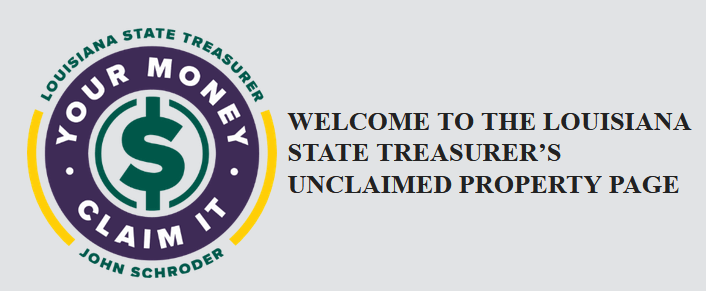
Step 2: Input your last name into the designated field. You also have the option to add the name or zip code of the city where you lived, which is useful for individuals with common names.
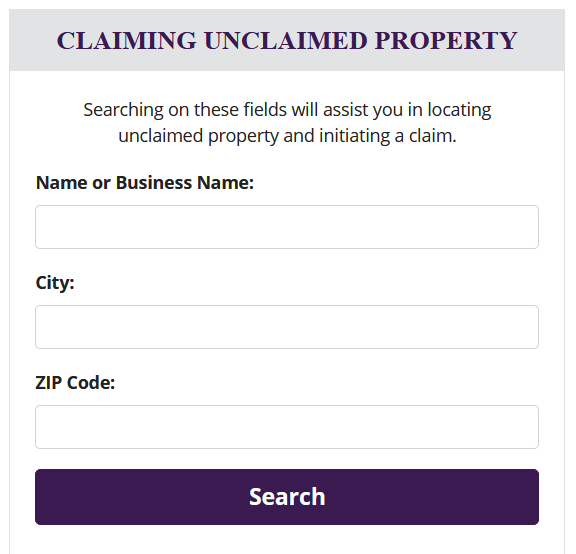
Step 3: Review the information presented on the results page to identify accounts that belong to you, taking into account matching names and addresses.
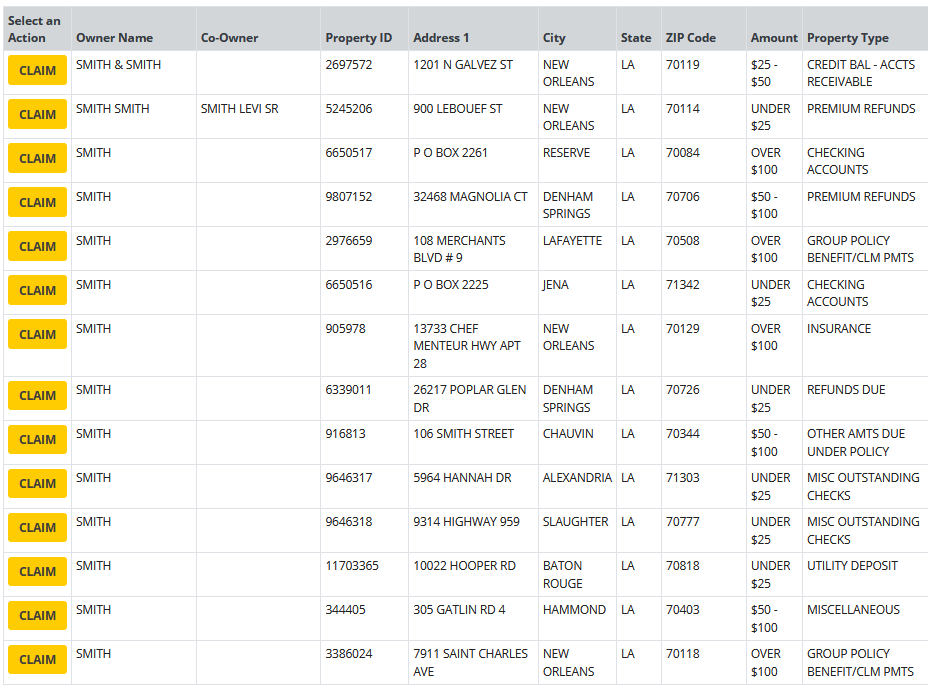
Step 4: When ready to file a claim, click the yellow “Claim” button. You can file for multiple accounts if necessary.

Steps to Claiming Abandoned Property in Louisiana
Step 1: Review the selected claim to ensure your information matches the account’s details.

Step 2: Use the “Claimant Relationship” drop-down menu to specify your relationship to the claim.

Step 3: Click the purple “File Claim” button to proceed.
Step 4: Complete the information form on the following page, ensuring you provide essential details such as date of birth, home phone number, address, and social security number.
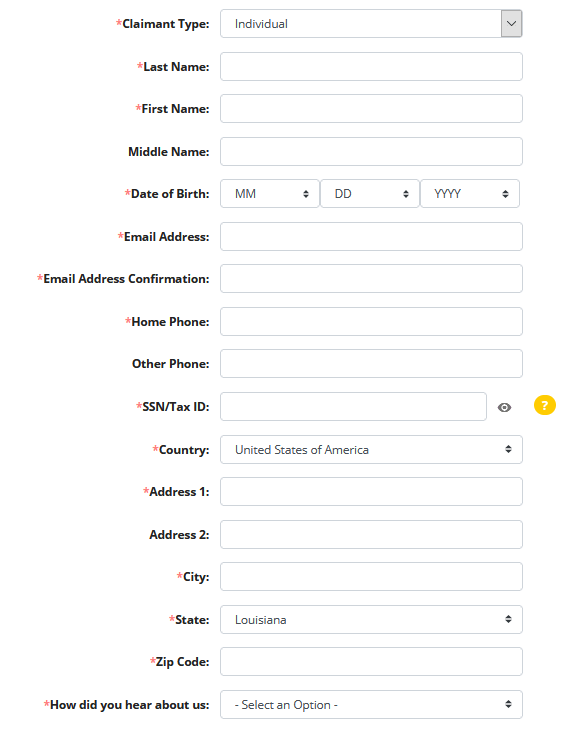
Step 5: After verifying your claim, click “Submit” to file it.
What Information Do You Need to File in Louisiana?
To file a claim in Louisiana, gather your personal information, and be prepared to print a copy of your claim form. It requires notarization, so ensure a notary stamps it when you sign and date the form. Additionally, you’ll need to send this document to the treasurer along with proof of your identity, address, and social security number.
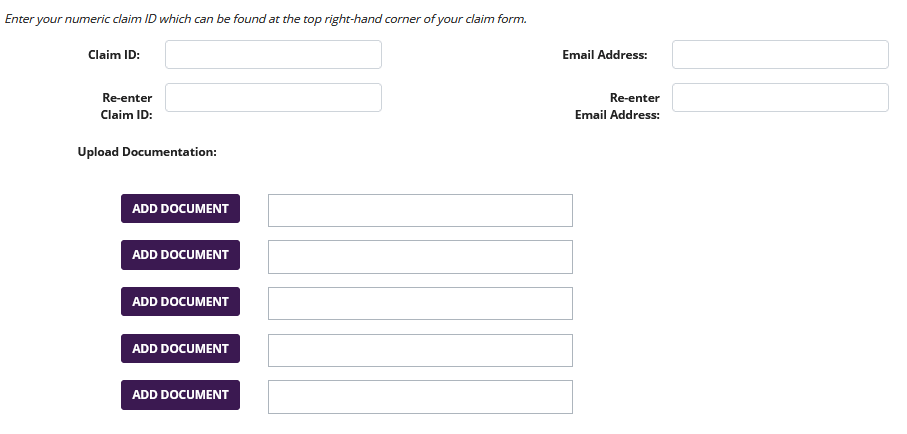
Keeping Track of Louisiana Claims
The Louisiana Unclaimed Property website provides a status checker for monitoring the progress of your claims. By entering your claim ID from the form, you can ascertain whether your claim is under review or if a check has been issued.

Where Else Can You Look for Abandoned Property?
Apart from the Louisiana Unclaimed Property website, you can explore other resources like Missing Money, federal agencies, and departments that offer assistance in locating unclaimed property. These include the Federal Deposit Insurance Corporation (FDIC), National Credit Union Administration, U.S. Railroad Retirement Board, Pension Benefit Guaranty Corporation, and more.
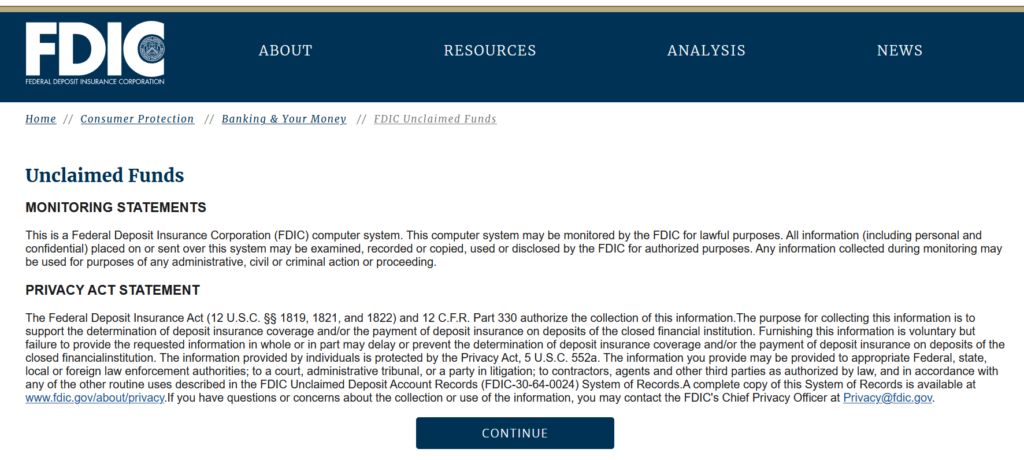
How Much Unclaimed Property is in Louisiana?
Louisiana’s Unclaimed Property Division oversees more than $1 billion in assets belonging to residents, part of the larger national pool that surpasses $70 billion. It’s essential to conduct searches not only in Louisiana but also across multiple states to potentially uncover more unclaimed property associated with your name.
Louisiana Unclaimed Property Laws
Louisiana has specific laws governing unclaimed property, dictating when holders must contact the treasurer, the duration they should hold the property, and the criteria for charging dormancy fees. Familiarizing yourself with these laws can be beneficial before initiating a claim.
What is a Dormancy Fee?
Holders may charge dormancy fees, but only if it’s stipulated in a contract signed by the owner. These fees can be deducted from the property’s balance when it’s worth less than $50.
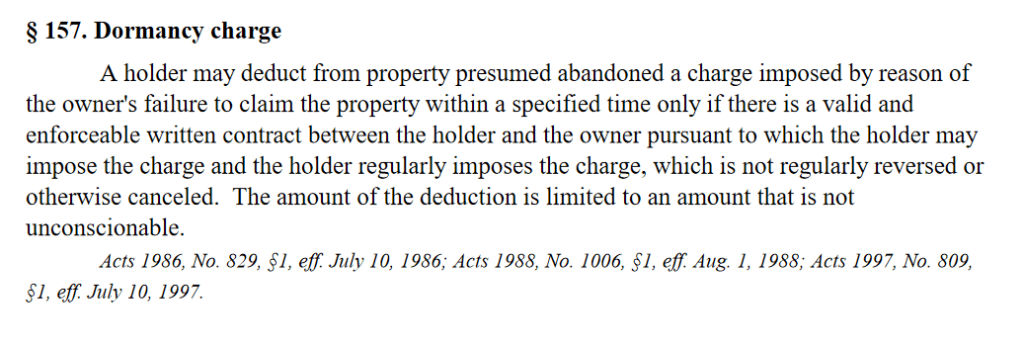
Does Louisiana Show the Total Value of Each Account?
Louisiana does not display the exact value of each account but provides categories indicating the property’s worth, helping you identify valuable claims.
What Happens if You Don't Include the Right Documents?
If you don’t provide sufficient documentation, you will receive a notification outlining the necessary steps to rectify the claim.
Can You Claim Louisiana Property as an Heir?
You can claim unclaimed property in Louisiana as the heir of a deceased person, provided you possess official court records or documents proving your status as the rightful heir.

How Long Does the Claim Process Take?
Claim processing times vary but typically take around 90 days, depending on claim volume.
What Happens to Abandoned Safe Deposit Boxes in Louisiana?
Holders can only open abandoned safe deposit boxes after five years of inactivity. The Louisiana State Treasurer sells the contents if the owner cannot be found.
Does Louisiana Take Any Steps to Find Owners?
The Louisiana State Treasurer actively seeks owners by sending letters, conducting database searches, and employing social media and advertising to promote awareness. There is no time limit for holding abandoned property, but it doesn’t encompass vehicles or real estate.
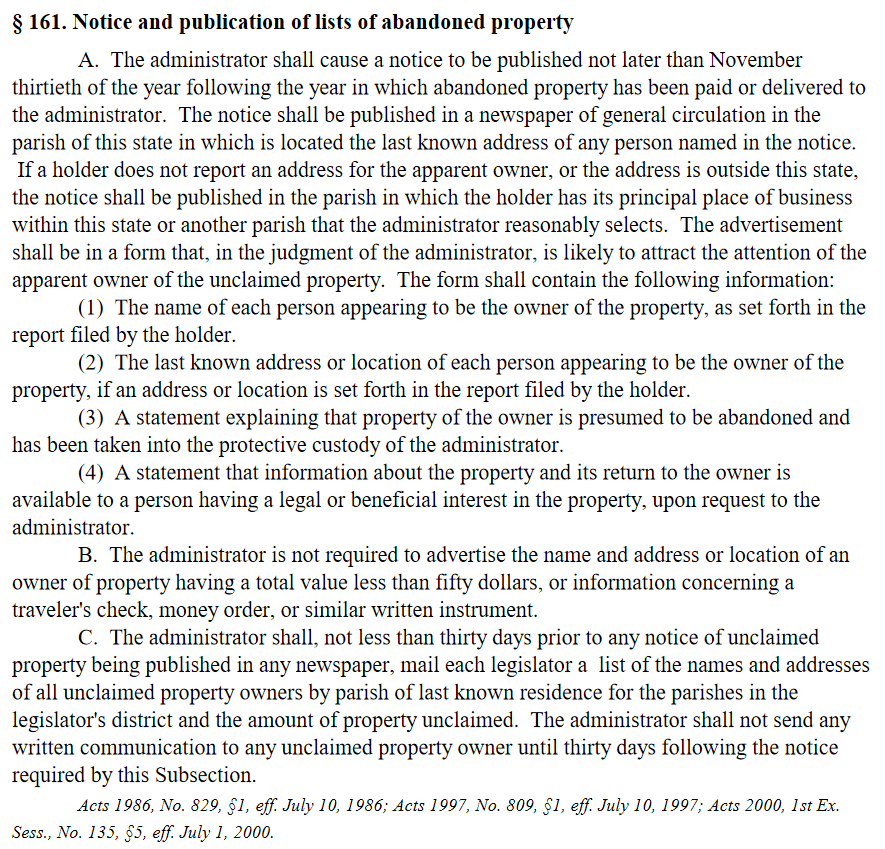
What Can You Do to Keep Your Property Safe?
To keep your property safe in Louisiana and reduce the risk of it becoming unclaimed, consider a few essential steps. Firstly, it’s advisable to notify trusted individuals when you open a safe deposit box and keep a spare key accessible. Secondly, for accounts that require annual activity to remain in good standing, set up alerts on your phone and desktop calendar to ensure you fulfill these requirements. Lastly, it’s a prudent practice to maintain an up-to-date list of all your properties and assets. Periodically review and revise this list, including your contact details and any necessary adjustments.
Conclusion
Don’t delay in checking with the Unclaimed Property Division to reclaim your rightful financial assets in Louisiana. Acting promptly will expedite the process of regaining control of your money. After utilizing our comprehensive guide to unclaimed money in Louisiana, explore additional resources we’ve uncovered, including guides for other states, to maximize your efforts in locating any unclaimed assets.
Quickly Search For Unclaimed Money
Disclaimer: OurPublicRecords mission is to give people easy and affordable access to public record information, but OurPublicRecords does not provide private investigator services or consumer reports, and is not a consumer reporting agency per the Fair Credit Reporting Act. You may not use our site or service or the information provided to make decisions about employment, admission, consumer credit, insurance, tenant screening, or any other purpose that would require FCRA compliance.